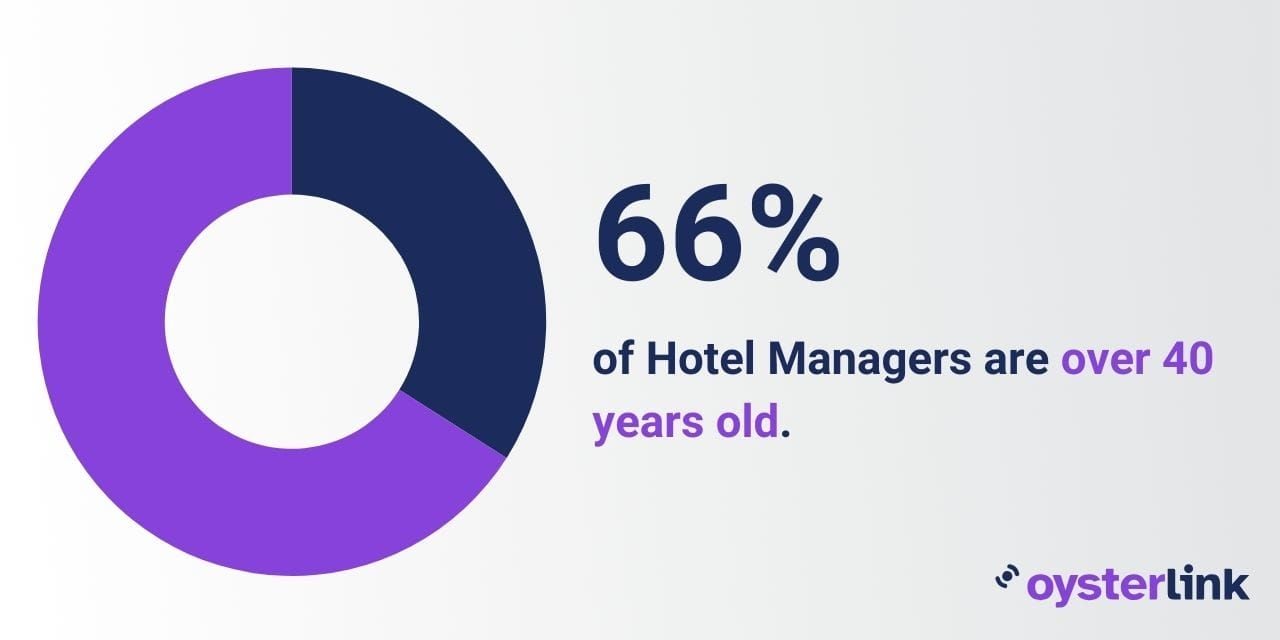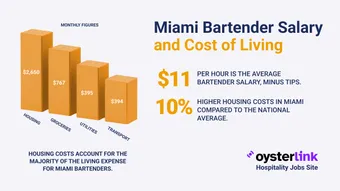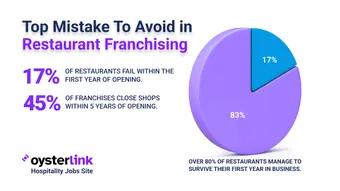Hotel Manager Age Requirements: Key Takeaways
- While no official age requirement exists for Hotel Managers, most employers prefer candidates in their 30s or 40s for their valuable experience and skills gained from industry roles.
- Most hotel managers in the U.S. are over 40, due to the experience required, but younger candidates can succeed with proactive career growth.
- Leadership, problem-solving and industry knowledge are key qualities employers seek, regardless of age.
- Educational backgrounds in hospitality or business, along with internships, can accelerate your path to management.
If you're working in a hotel and aspiring to move up the ladder to a Hotel Manager position, you might be wondering how old you have to be to be a Hotel Manager.
While there’s no specific age requirement set by U.S. law, it’s essential to consider what hotel owners and management companies typically prefer when hiring for these roles. Understanding these preferences can help you set your career goals and timelines.
The Role of a Hotel Manager
Before diving into age considerations, it's important to understand what a Hotel Manager actually does. As a Hotel Manager, you’ll be responsible for a wide range of tasks that ensure the smooth operation of the hotel.
Here are some key responsibilities associated with the role:
- Overseeing daily operations: Managing front desk services, housekeeping, and food and beverage operations to guarantee a seamless experience for guests.
- Guest services: Ensuring that guest inquiries and concerns are addressed promptly and professionally to foster a welcoming environment.
- Staff management: Recruiting, training, and evaluating hotel staff, providing guidance and support to enhance team performance.
- Quality maintenance: Upholding the hotel’s standards for cleanliness, comfort, and customer service to ensure high levels of guest satisfaction.
- Financial management: Developing and managing budgets, monitoring expenses, and implementing cost-saving measures to maximize profitability.
- Marketing and sales: Collaborating with marketing teams to promote the hotel, enhance visibility, and increase occupancy rates.
- Safety compliance: Ensuring that the hotel adheres to health and safety regulations, creating a safe environment for both guests and employees.
This role can be both challenging and rewarding, requiring strong leadership, exceptional organizational skills and effective communication.
How Old Do You Have To Be To Be a Hotel Manager?
While there isn’t an official age requirement to become a Hotel Manager, most hotel owners and employers tend to prefer candidates with a solid background in the hospitality industry.
They often look for individuals in their 30s or 40s, as this age group typically brings valuable experience and skills gained from working in various roles.
That said, age isn’t everything. Many people can reach managerial positions at different ages based on their unique experiences and commitment to their career growth.
Some may even achieve this goal sooner by actively seeking out opportunities like internships, leadership training and networking in the industry.
Employers also value qualities like problem-solving skills, leadership potential and a strong understanding of customer service trends.
So, regardless of your age, showcasing a strong work ethic and a passion for delivering great service can greatly improve your chances of becoming a Hotel Manager.
What Is the Average Age of a Hotel Manager?
The average age of Hotel Managers in the U.S. reflects the extensive experience required in the hospitality field. In fact, around 66% of Hotel Managers are over 40 years old.
This trend arises from the need for several years of hands-on experience in various hospitality roles before taking on the responsibilities of a manager.

Many individuals in this age group have climbed the ranks through different positions, such as Front Desk Agents, Event Coordinators or Food and Beverage Supervisors, gaining valuable insights along the way.
Their years of experience help them efficiently manage the diverse challenges that come with overseeing hotel operations.
However, it’s important to note that this average age doesn’t mean younger candidates can’t succeed. Some people reach the role of Hotel Manager in their 30s, especially if they are proactive about their career paths and take advantage of opportunities available to them.
Educational Requirements for Hotel Managers
In terms of education, many Hotel Managers have degrees in hospitality management, business administration or a related field. A solid educational background provides aspiring managers with the knowledge needed to understand the operational aspects of running a hotel.
Internships and hands-on training during your educational journey can be invaluable. These experiences allow you to apply what you’ve learned in school to real-world situations, helping you develop skills and establish connections in the industry.
Tips for Aspiring Hotel Managers
If you’re serious about becoming a Hotel Manager, consider the following practical advice to position yourself for advancement:
- Look for mentorship opportunities: Connect with experienced professionals in the industry who can offer guidance and insights as you navigate your career path.
- Continuously improve skills through workshops and seminars: Stay sharp by participating in relevant training sessions that focus on leadership, customer service or management techniques.
- Stay updated with industry trends and technology: The hospitality industry is constantly evolving, so keeping up with new trends and technologies can give you a competitive edge.
See also: Pros and Cons of Being a Hotel Manager
Using OysterLink To Launch Your Hospitality Career
While the majority of Hotel Managers in the U.S. are over 40 years old, age is not the only factor determining success in this role. Many individuals in their 30s achieve managerial positions by taking advantage of growth opportunities and demonstrating strong leadership skills.
If you’re aspiring to become a Hotel Manager, consider using platforms like OysterLink. OysterLink specializes in connecting job seekers with various positions in the hospitality industry, including managerial roles.
The platform also features valuable career advice, industry insights and interviews with successful managers to help you navigate your career path effectively.







